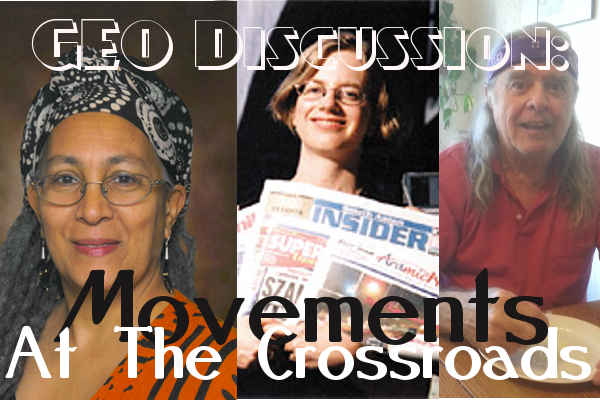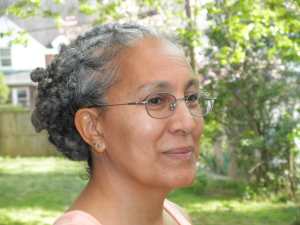
Are the Cooperative & Solidarity Economy Movements Ready for a Breakout Path?
[Editor's note: this conversation with GEO members Dr. Jessica Gordon Nembhard and Michael Johnson, and progressive journalist Abby Scher was recorded on February 11th, 2016.]
At the Crossroads: are our Co-operative/Solidarity movements ready for a breakout path?
by Michael Johnson
In interviews related to her Collective Courage Jessica Gordon-Nembhard has twice hit a note I think is a bottom line issue, and have for a long time. Here is how she addressed it in her ‘next system’ interview:
[Fanny Hamer] really is saying something in the 70s that Du Bois actually said in 1907… And of course he said we took the wrong road, right? We’re at a crossroads [now], but it looks like we’re going towards that individualist, capitalist route, which is basically what we did. But we should have taken the other route. And I think that we’re at the same crossroads again. Actually, we’ve been at the crossroads many times. We keep taking the wrong route. But we have a chance to take the better route, to correct our route… And we actually know how to do it. One of my pet peeves is that we keep thinking we don’t know what to do, but we do know because we have lots of models that have succeeded over the centuries… What we don’t have is enough will and enough education about how to do it.
Abby Scher, a progressive journalist, and I joined with Jessica in February to discuss our movements being at the crossroads. In this podcast we sought to cut to the heart of that core issue that needs open discussion, especially at this time of a co-operative/solidarity boom in the US.
In that same interview Jessica also gave her vision of the path we should be taking:
The next system that I think we need, and that I think hopefully we’re moving toward, would be what I call a cooperative commonwealth and a solidarity economy. By a “cooperative commonwealth” I mean a system of interlocking cooperative ownership structures in all industries and all sectors of the economy, where co-ops supply each other and feed into each other and fund each other. And cooperative can be loose in terms of any kind of economic cooperation in a solidarity system. By “solidarity system”, I mean a non-hierarchical, non-exploitative economic system geared toward the grassroots that’s indigenous, participatory and that’s democratized a sense of capital.
In her interview with Ajawo Ifateyo Jessica expanded on her view of the crossroads problem, touching on the underlying cultural conundrum involved:
…why is it that so many people who need co-ops the most either don’t know about them or afraid to try them or use them? A lot of it is because of the hegemony of capitalist ideology. Even as kids we’re taught about the Horatio Alger myth -- that we just have to work really hard and then we can own our own business or get a great job and become millionaires. We’re not taught about how the millionaires even needed government, and needed other people to help them, and that they didn’t do it on their own. We’re just taught you do it on your own, you work hard and then you’re done.
We’re taught to fear ideas about joint ownership because 1) we’re taught that it’s communist or socialist, and of course that’s horrible. We don’t want to be labeled that, or be thinking about that; 2) we’re taught it’s too hard because we’re really all greedy and we don’t like to share and it’s too hard – it’s unnatural – to get people to share. And then we’re not shown how to do it, we’re not taught how to cooperate or to make decisions collectively, or to share ideas about money. In fact, we’re taught the opposite – how to hoard and how to “get ours” and forget everybody else.
I have argued before that families teach our children about morality in terms of how to treat one another, except when we enter the workforce. When we enter the workplace or into economic exchanges, we’re told to leave all of our morality at the door. And then when we go into the economic sphere, it is all “dog-eat-dog,” - don’t care about your neighbor, don’t help anybody – just get yours. That makes no sense. That’s anti-human. So meanwhile, we’re not supposed to hit the kid on the playground, but as soon as you get into the work arena, smash ‘em down as much as you can and step over ‘em to get to the top. What kind of sense can that make? And how can you do community development under those circumstances?
Go to the GEO front page
Citations
Jessica Gordon Nembhard, Michael Johnson, Abby Scher (2016). Movements at the Crossroads: Are the Cooperative & Solidarity Economy Movements Ready for a Breakout Path?. Grassroots Economic Organizing (GEO). https://geo.coop/story/movements-crossroads

 Jessica Gordon Nembhard is a political economist and Associate Professor of Community Justice and Social Economic Development in the Africana Studies Department at John Jay College, City University of NY; and author of
Jessica Gordon Nembhard is a political economist and Associate Professor of Community Justice and Social Economic Development in the Africana Studies Department at John Jay College, City University of NY; and author of
Add new comment